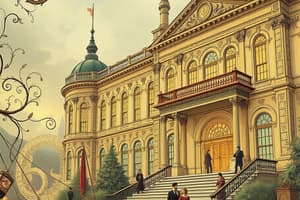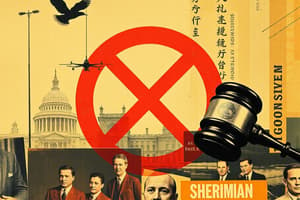Podcast
Questions and Answers
What is the primary purpose of labor unions?
What is the primary purpose of labor unions?
- To limit worker rights and benefits
- To increase the workload on individual workers
- To reduce the number of workers in an industry
- To improve working conditions for their members (correct)
What was a significant outcome of the Homestead Strike?
What was a significant outcome of the Homestead Strike?
- A 20% cut in workers' pay (correct)
- A violent conflict involving the military
- The establishment of a new labor union
- A major increase in railroad freight rates
What role did 'scabs' play during labor strikes?
What role did 'scabs' play during labor strikes?
- They supported the strikers with financial aid
- They organized the strikes
- They served as replacement workers (correct)
- They negotiated on behalf of the workers
Which of the following best describes the impact of political instability on social class movement?
Which of the following best describes the impact of political instability on social class movement?
Which historical event involved 80,000 workers refusing to work to demand better conditions?
Which historical event involved 80,000 workers refusing to work to demand better conditions?
What was prohibited to promote competition in the marketplace?
What was prohibited to promote competition in the marketplace?
What characterizes a trust in business?
What characterizes a trust in business?
Which philosophy suggests that only the fittest individuals will succeed in business?
Which philosophy suggests that only the fittest individuals will succeed in business?
How did the federal government generally support the railroad industry?
How did the federal government generally support the railroad industry?
Which of the following best describes the role of industrialists in society according to contrasting perspectives?
Which of the following best describes the role of industrialists in society according to contrasting perspectives?
What type of industry was specifically mentioned as benefiting from government support?
What type of industry was specifically mentioned as benefiting from government support?
What was a key implication of the quote regarding the American Beauty Rose?
What was a key implication of the quote regarding the American Beauty Rose?
What was one of the consequences of laissez-faire policies in business?
What was one of the consequences of laissez-faire policies in business?
What characterized the Gilded Age in America?
What characterized the Gilded Age in America?
What was the primary factor that led to rapid urbanization during the Gilded Age?
What was the primary factor that led to rapid urbanization during the Gilded Age?
Which invention is associated with the industrialization during the Gilded Age?
Which invention is associated with the industrialization during the Gilded Age?
What does vertical integration refer to in a business context?
What does vertical integration refer to in a business context?
What was the primary reason immigrants moved to the United States during the Gilded Age?
What was the primary reason immigrants moved to the United States during the Gilded Age?
What role did natural resources play in the economic expansion during the Gilded Age?
What role did natural resources play in the economic expansion during the Gilded Age?
What impact did the Gilded Age have on American demographics by 1920?
What impact did the Gilded Age have on American demographics by 1920?
What economic policy is defined by minimal government intervention in business?
What economic policy is defined by minimal government intervention in business?
What action did President Hayes take in response to the strike?
What action did President Hayes take in response to the strike?
What was the approximate cost to repair the damages caused by the strike?
What was the approximate cost to repair the damages caused by the strike?
What was the outcome of the conflict between police and labor activists in Haymarket Square?
What was the outcome of the conflict between police and labor activists in Haymarket Square?
Which group did the governor of Pennsylvania send to protect the strikebreakers?
Which group did the governor of Pennsylvania send to protect the strikebreakers?
What term describes the prevalent discriminatory attitudes against immigrants during this time?
What term describes the prevalent discriminatory attitudes against immigrants during this time?
How many fatalities occurred during the clash at Haymarket Square?
How many fatalities occurred during the clash at Haymarket Square?
Which industry was NOT mentioned as being dominated by wealth during the Gilded Age?
Which industry was NOT mentioned as being dominated by wealth during the Gilded Age?
Which individual was associated with the oil industry during the Gilded Age?
Which individual was associated with the oil industry during the Gilded Age?
Study Notes
Sherman Antitrust Act
- Prohibited activities that restrict interstate commerce and competition
- Outlawed trusts and monopolies
- Trust: Organization of businesses in the same industry, forming a group that controls production and distribution for less competition
- Monopoly: Businesses that control a specific sector of the economy, including prices
Social Darwinism
- Philosophy that only the fittest survive in business and society
- Those with a successful business are the strongest, as well as individuals who are naturally better, smarter, and fit for society
Laissez-Faire Business
- Businesses grew unregulated with limited government intervention
- Government broke strikes in favor of business
- The federal government gave land grants to help the railroad industry build the railroad
Industrialist Perspectives
- Were honest, philanthropic businessmen who created markets, improved society, and created jobs
- Were ruthless businessmen who manipulated the government, exploited workers, and swindled investors
Key Terms
- Gilded Age: The time in America between Reconstruction and WWI with an increase in industry, urbanization, and immigration
- Industrialization: growth of industry and machinery used in production
- Urbanization: The growth of cities due to people migrating from rural areas to cities
- Immigration: Many people migrated to the US, most settling in cities
- Between 1870 and 1920, 11,000,000 people migrated from rural to urban areas
- By 1920, more Americans lived in cities than in rural areas for the first time in US history
- Reasons for the increase in population in cities include new inventions such as cars, Bessemer Process, and the telegraph
- Issues that arose from the rapid growth of cities included:
- Labor
- Capital
- Land
- Natural Resources
Business Strategies:
- Laissez-Faire: Government should interfere as little as possible with businesses
- Vertical Integration: Business controls all factors of production (ex. coal mines - trains - shipping)
- Horizontal Integration: Business strategy involves buying competing companies (ex. oil field - oil field - oil field)
Immigration
- Immigrants came to America for jobs and land after the Civil War
- Opportunities for immigrants included:
- Democracy
- Availability of:
- Land
- Jobs
- Social Mobility
- Challenges faced by immigrants included:
- Wars
- Political tyranny and instability
- Limitations:
- Social class movement
- Religious freedom
- Land Ownership
Labor Unions
- An organization of workers who have a collective interest in improving their working conditions
- Union examples include the American Federation of Labor and the Knights of Labor
- Unions used strikes to get industrialists to meet their demands
- Strike: Laborers refusing to work until their demands are met
- Scabs: Replacement workers
- Strikes include:
- The Railroad Strike of 1877: 80,000 workers went on strike, damaging equipment and blocking service to 2/3 of railways
- The Homestead Strike: 10,000 steelworkers went on strike due to a 20% pay cut
- The Haymarket Riot:
- Labor activists protested the killing of workers by police during a strike a day before
- There was a protest of around 2,000 people near Haymarket Square
- Chaos erupted when police reached the crowd and an individual threw a bomb.
- 7 police officers died and one civilian.
- There was xenophobia against German immigrants.
- 8 men labeled as anarchists and believed to be connected with the bombing were convicted without evidence.
- 4 of the men were hanged and 1 committed suicide before his hanging
Wealth in America
- By 1897, the top 4,000 families in the US (representing less than 1% of the population) had about as much wealth as the other 11.6 million families (99% of the population)
- The wealth of some prominent business leaders included:
- Rockefeller (Oil): $409 Billion
- Carnegie (Steel): $310 Billion
- Ford (Automotives): $199 Billion
- Vanderbilt (Railroads): $185 Billion
- J.P. Morgan: $49 Billion
Studying That Suits You
Use AI to generate personalized quizzes and flashcards to suit your learning preferences.
Related Documents
Description
This quiz covers key concepts from the Sherman Antitrust Act, Social Darwinism, and the principles of laissez-faire business. Explore the differing perspectives on industrialists, their impact on competition, and the societal implications of unregulated business practices. Test your understanding of these pivotal topics in American economic history.




